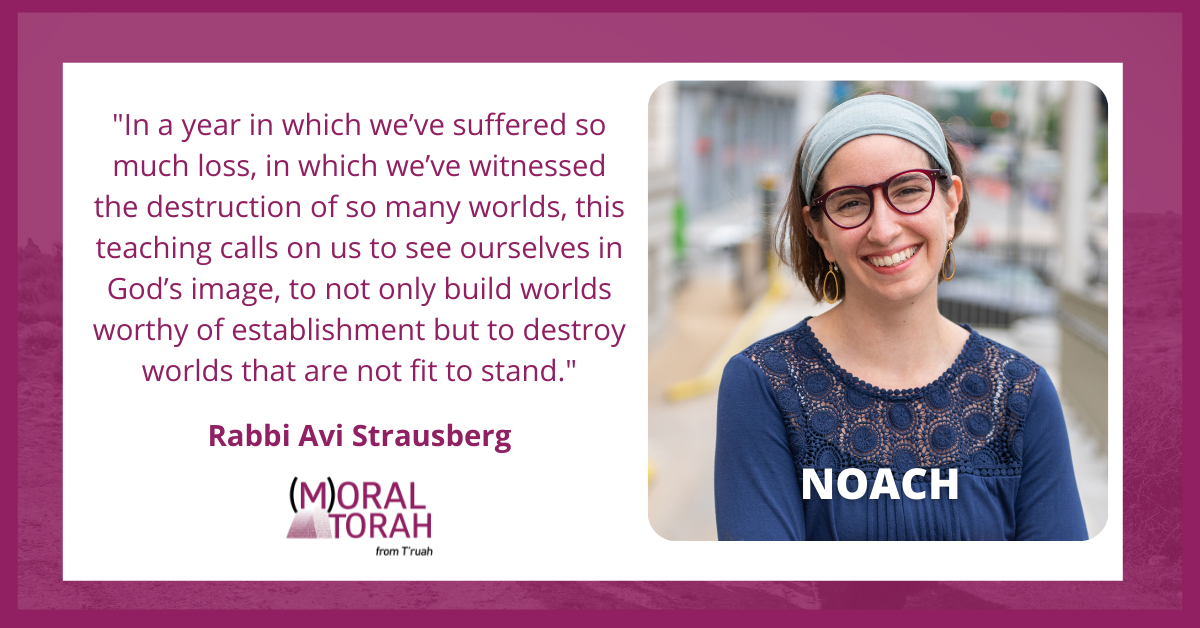A D’var Torah for Parshat Noach by Rabbi Avi Strausberg
In the beginning, there was nothingness. And then God took to creating the world. God separated light from darkness, day from night, water from dry land. And a vision of a livable earth was called into existence. And God was pleased with it. With each act of creation, with each move towards an ordered existence that could sustain life, God saw that it was good.
Until it was no longer good. God saw the wickedness that spread throughout the earth. A world lacking in decency and kindness. And God regretted this world that God created. (Genesis 6:5-6)
Just as God created the world, God saw fit to destroy the world. Just as the world began in chaos, God plunged the world back into chaos, a return to a wilderness of water, wind, and darkness.
Noah’s flood blotted out all life from the face of the earth. The world to which Noah and his fellow ark dwellers re-emerged was a world nearly unrecognizable. They would have to begin again.
Genesis Rabbah teaches that the flood was not the first time God created a world only to destroy it. Rather, in God’s efforts to produce a viable world, God created and destroyed many worlds. According to the midrash, after many attempts at creation, finally God arrived at our world and said, “This one pleases me; the others did not please me” (Genesis Rabbah 3:7). On the ruins of all of the destroyed worlds, God builds something that is fit to stand.
Sign up to receive (M)oral Torah in your inbox each week.
Based on this midrash, 19th century thinker Rabbi Natan Tzvi Finkel of Slobodka teaches, “We are forced to say that also in the destruction of the worlds there is great wisdom, and from this wisdom emerged the world that exists.” (Ohr HaTzafun, p. 71) This lesson runs contrary to what we instinctively believe, that destruction marks the end of something. We mourn the loss of the thing that came before; it is difficult for us to imagine a way forward out of the wreckage. Rabbi Finkel teaches us that, rather than seeing destruction simply as ruins, we must also look for the wisdom contained within destruction.
Not only God has the power to create out of destruction; we, like God, are gifted this same ability — to find wisdom in the ruins and to create worlds on the backs of those destroyed. Rabbi Finkel writes: “This is what it means for the likeness of humanity to be created in the likeness of God.” (Ohr HaTzafun, p. 72) To be created in God’s image means that we, like God, have the power to create and to re-create, to rebuild when there has been destruction.
In a year in which we’ve suffered so much loss, in which we’ve witnessed the destruction of so many worlds, this teaching calls on us to see ourselves in God’s image, to not only build worlds worthy of establishment but to destroy worlds that are not fit to stand. What did the pandemic that wreaked havoc across an entire globe teach us about our world pre-pandemic? What weaknesses were exposed? What fault lines were revealed? While we may mourn the losses that came with the destruction of these worlds, we are called to build again. We are encouraged to see ourselves as builders and creators, capable of new beginnings.
But how do we build worlds out of the ruins? In another essay, Rabbi Finkel teaches that the world was built on chesed, loving-kindness. He writes,
All of the lower and upper worlds… were created with the attribute of chesed, and with chesed all of creation was formed. Because a person is obligated to be similar to God in all of God’s attributes, so too it is upon a person to create worlds like God, as it is taught, ‘Be similar to God. Just as God is merciful and compassionate, so too you should be merciful and compassionate. (Ohr HaTzafun, p. 9)
Just as God creates with wisdom out of destruction, so, too, we must build new worlds that are more just, more elevated than the ones that came before. Just as God creates worlds built upon chesed, so, too, we must create through chesed.
Find more commentaries on Noach.
The past year and a half has brought with it the destruction of many worlds that we may have loved and taken for granted. For many months, we found ourselves cut off from our family and friends, facing experiences of work and community drastically different from those to which we were accustomed. But now is the moment to begin rebuilding. We have the opportunity to reconstitute these worlds; the way to do so is through acts of chesed. Acts of chesed imbue us with hope. They help us imagine that there might be a path forward. They tether us together more tightly, one act of caring at a time.
In her poem “All I Cannot Save,” Adrienne Rich writes,
My heart is moved by all I cannot save
so much has been destroyed
I have to cast my lot with those
who age after age, perversely
with no extraordinary power
reconstitute the world.
As you look forward to the months of rebuilding to come, ask yourself: How will you help to rebuild? What acts of chesed, what possibility and hope will you bring to the world? How will you be like God?
Rabbi Avi Strausberg is the Director of National Learning Initiatives at Hadar and lives in Washington, DC.

